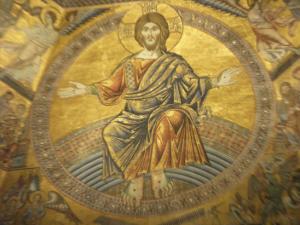
Look to beauty, all sorts.
Once in Tsarskoye Selo I saw so much beauty at once that I was unable to process more. All I could do was pray. There is a limit to what we can handle even if the thing is good. The beauty in creation, constantly changing and growing, would kill us if we saw it all at once. Thank God we cannot. We see a bit, first when we open our eyes, then in our mothers, in family (if we are so blessed), in beloved community, eternal ideas, and finally in God. There is so much beauty.
The goodness of being alive is very great. Never follow fear, because love is the pathway to joy. There is ugliness we must oppose, but only because we love beauty more. Our opposition to ugliness must always be in service of the love of beauty. We are against the ugliness of Soviet communism, from the gulags to the art, because we love the authentic beauty of Russian culture.
God made many beings, reflections of goodness, truth, and beauty. Each of us is a take on that divine beauty, the Craftsman’s capturing how the True Light hits one little bit of material reality. Things may reflect that light more or less well. Some beauty is simple, some complex. God allows our taste, though not our bigotry. We can prefer one beauty to another Bach over Mozart if we wish, but we must not lie and any the beauty of something that happens not to be to our taste. Home ways, art, music, literature, always has a special place in our hearts, yet we know that this preference is not the truth about the beauty of the world, merely about our desires.
Wise people learn to want more and learn to appreciate more.
Any day can be a time where we can create beauty and the choices are vast. We might cook a meal for our beloved, take a walk to a garden, or simply look at the stars. There is so much natural beauty that we can, with even a bit of training, make more! We can decorate, accentuate the beauty. What will we do?
We choose!
So it is with God. There is a profound and necessary usefulness in thinking of things numerically that are either impossible or very hard to quantify. The disastrous results of trying to measure “smarts” with numbers, the hidden assumption of such testing, should make us hesitant to say of beauty or goodness that this is 50% more beautiful or good! Good is good, beauty is beauty. We might generally recognize that the icon of Aksum is more beautiful than my feeble attempts to draw without the false precision that says the icon is 98% better.
When we say two people are “equal” this is a similar useful fiction. People are precious, unique, in the image of God in fantastically diverse ways. We cannot trust ourselves, broken as we are, not to judge others based on our preferences, so we simply state we are equal. That is a bit sad, because that flattens out what each of us need, want, and could be. This staggering wonderful beauty in each human must be recollected even when for the sake of justice, in our blind state, we must ignore that individuality.
Oddly, I have had more than one conversation with a person who does not believe in God who wonders why God does not act based on “a net good.” Here is one case:
Please give an example, or specify what sort of criteria might rule out a net good from being acted upon.
This is hard to answer, because how can we really get a “net good” as if that would be a number? There are worse moral outcomes and better moral outcomes generally, but how much better or worse? Amongst the “good outcomes” how would we measure the “best?”
Tomorrow could have no sin and ice cream, good, or no sin and chocolate, also good. Which? God might choose, freely, one good over the other. Of course, the cosmos is so interconnected and complex that there might be good reasons to make tomorrow an ice cream and not a chocolate day, but this need not be so. There are many goods that if not (really) “equally” good are similarly beautiful and good.
The answer to this question is that even if there was no sin, no brokenness in all the cosmos, there would still be an infinite number of wonderful, beautiful outcomes. God might prefer one to another and God is always just so this preference would not be the result of bigotry or narrowness, they all would be delightful. There might be a universe with Niagara Falls, a marvel of beauty, but another without the Falls having a particularly gentle and peacable stretch of the Niagara River instead. Which is best? This is impossible to answer and so we are left with the excitement of seeing what beauty God will bring to pass. Similarly in a cosmos where God wants the “best” there would be some worlds better than others, but also possible worlds where everything is good, just a different good. One timeline has beings who create greater music, the other one where the same talent and time is spent on marvelous art.
Given our free wills, that break the possibility of particular perfection in our timeline, then God would still with infinity and omnipotence at hand have many ways of redeeming the bad, the ugly, and making something best. There are many bests.
The response to this general arguments was:
To the perceptions of an omniscient deity, it’s pretty unlikely that much of anything comes out as exactly equal. At what decimal place does the Lord round off again??
This is true! The Lord God does not face an “equal,” but different, that can be given a precise quantification. The ice-cream Friday is 15 good points and the chocolate Friday is 15.01. Instead, God faces a plethora of possibilities and chooses as well amongst the “goods” that are all as good as they can be given the evils we have done. Which? We wait and see cheerfully, cooperating in creating beauty out of love!












